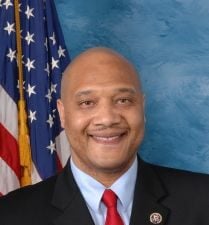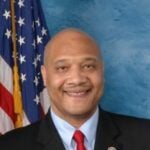
Early voting in Indianapolis is open now until Nov. 4. Voting is easier than ever, but we can’t forget what it took to get us here — and how far we still have to go.
It’s no secret that many Americans are disillusioned with politics and believe their vote doesn’t matter.
When Black voters engage, our electorate is powerful. The number of Black eligible voters is up 7% from 2020, with 34.4 million voters. That amounts to 14% of the total U.S. electorate.
Right now, you are likely being inundated on television, the radio and social media with information about the election. It can be overwhelming and tiring. But we can’t tune it out, and we must turn out our vote and make our voices heard.
For decades and persisting today, those in power have attempted to silence our vote and our voices.
The Voting Rights Act of 1965 was landmark legislation prohibiting racial discrimination in voting against Black Americans. It was paid for in blood and bruises that we must never forget or take for granted. Especially because threats to the right to vote persist today — particularly for Black Americans.
Between Jan. 1 and May 3 of this year, at least six states enacted seven restrictive voting laws, including Indiana. The Indiana Statehouse’s House Enrolled Act 1264 requires voting officials to verify citizenship by comparing the statewide voter registration system with the Bureau of Motor Vehicle’s list of temporary credentials given to noncitizens. While the bill claims to prevent noncitizens from voting, in practice, it could make it harder for eligible, registered U.S. citizens to vote.
This bill expands a national “crack down” on noncitizens from voting. The problem? It is already illegal for noncitizens to vote, and studies show that voting by noncitizens is incredibly rare — because it’s already a federal crime that could result in five years in prison simply for registering to vote, and it’s already a deportable offense. Plus, it would prevent noncitizens from becoming citizens, so it’s no surprise it’s not a risk most people would be willing to take.
The SAVE Act is a Republican bill in Congress that would prevent Americans from using their military IDs or Tribal IDs when registering to vote. I strongly oppose this bill, alongside civil rights groups and voting rights advocates across the country.
The SAVE Act places unnecessary burdens on voters based on a virtually nonexistent problem. Rather than targeting voter fraud — again, which is very rare — it would mean some active-duty service members and millions of married women who have changed their names would not be able to use their birth certificates to prove their citizenship. Military service members deployed overseas could have to come back to the U.S. to register to vote.
We need to make voting easier, not harder. These restrictive and redundant new laws use scare tactics that have no basis in fact and impose an unnecessary burdens on our most sacred right: the right to make our voices heard at the ballot box.
It’s why I’ll continue to oppose these senseless, dangerous bills and fight for the expansion of voting rights, like the Freedom to Vote Act, the Native American Voting Rights Act and the John R. Lewis Voting Rights Advancement Act — named after my friend and mentor the late, great Congressman John Lewis.
We can beat back these threats to silence our voices. And the best way to do this is by voting.
In Indianapolis, you can go to vote.indy.gov to find voting centers near you. You can go to any location in Marion County — on your way to and from work and school, church or the grocery. AARP Indiana and the IndyGo Foundation are offering free fare to riders on Election Day, which is Nov. 5 from 6 a.m. to 6 p.m. Right now, you can vote early at the City-County Building, and more locations open Oct. 26.
Whenever, or wherever you vote, it’s important that everyone finds a plan that works for you and your family and friends too.
Every time we vote — regardless of the outcome of the election — we send a message to all elected officials and leaders: we have a voice, and we are making our voice heard.
Every time we vote, we send a message about what we care about, and the change we want to see in our community. Besides the presidential race, there are many down ballot races in Indiana that affect our day-to-day lives.
Every time we vote, we set an example for our children, our family members and our neighbors: change doesn’t come from sitting on the sidelines.
Every time we vote, we honor everyone who sacrificed for our right to vote — those who came before us, and those who are depending on us to keep up this fight for our freedoms today, and for our future.








